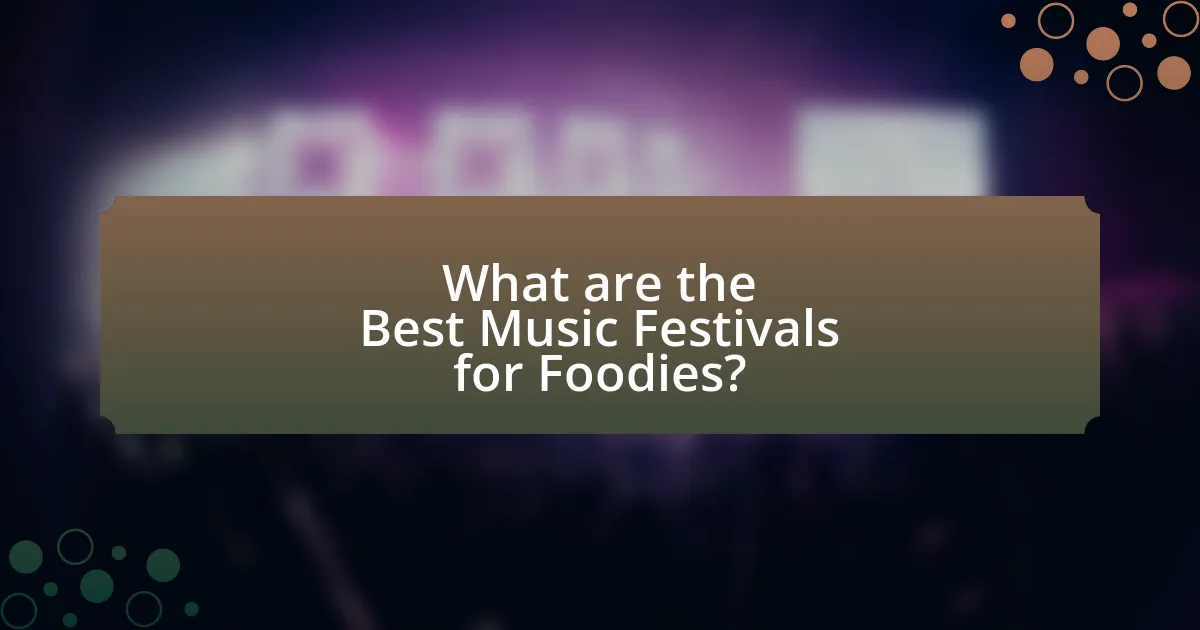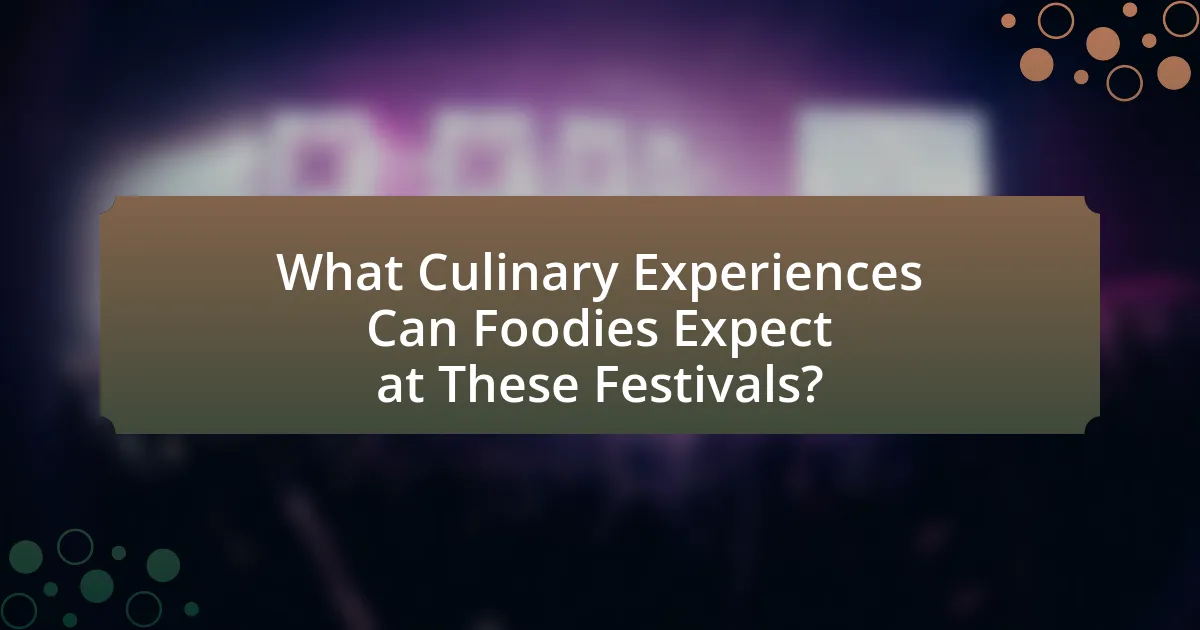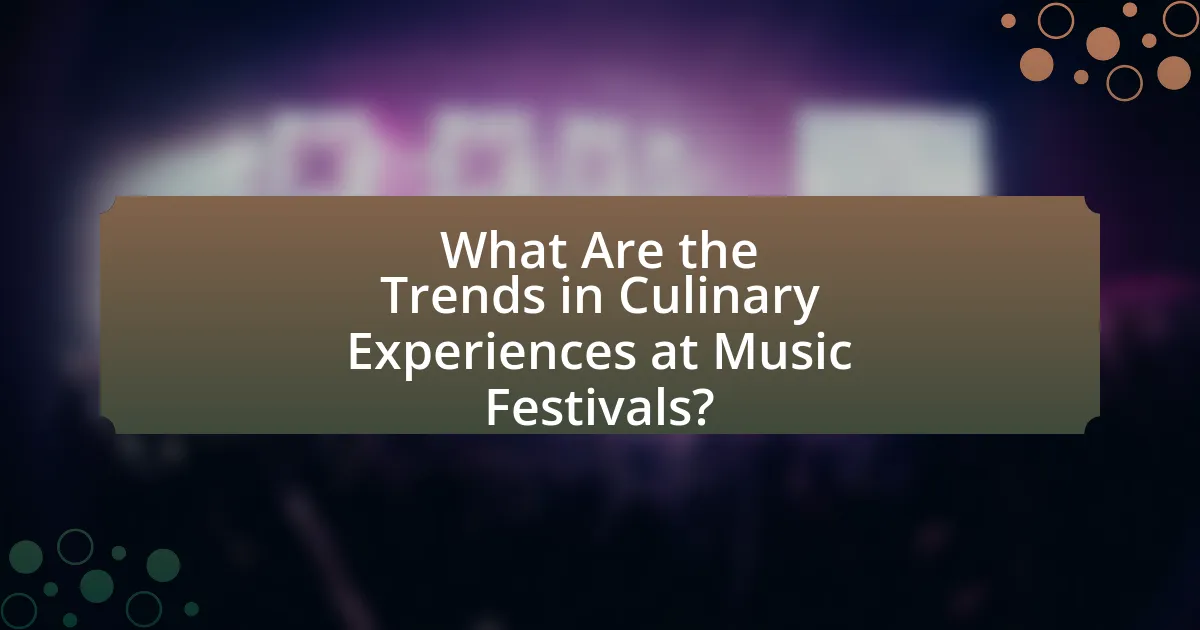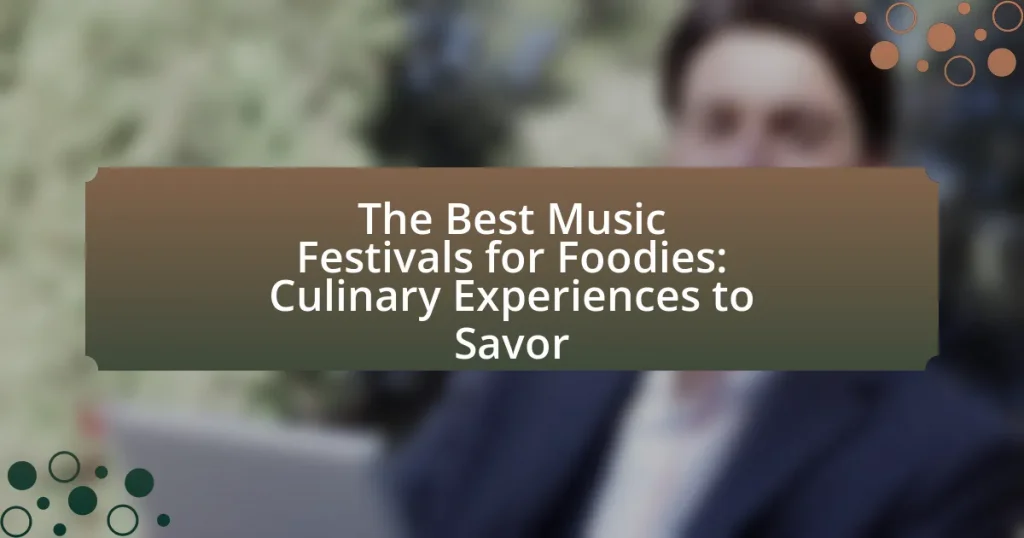The article focuses on the best music festivals for food enthusiasts, highlighting events such as the New Orleans Jazz & Heritage Festival, Coachella, and the Austin City Limits Music Festival. It explores how these festivals incorporate diverse culinary experiences, featuring local and international cuisines, gourmet food vendors, and interactive cooking demonstrations. The piece also discusses the significance of local cuisines, dietary preferences, and emerging food trends at festivals, emphasizing the role of food in enhancing the overall festival atmosphere and attendee experience. Additionally, it provides practical tips for foodies to maximize their culinary exploration at these events.

What are the Best Music Festivals for Foodies?
The best music festivals for foodies include the New Orleans Jazz & Heritage Festival, Coachella, and the Austin City Limits Music Festival. The New Orleans Jazz & Heritage Festival is renowned for its diverse culinary offerings, featuring local Creole and Cajun dishes alongside international cuisine, attracting over 400,000 attendees annually. Coachella, while primarily known for its music, also showcases a wide array of gourmet food vendors, including vegan and artisanal options, making it a culinary hotspot. The Austin City Limits Music Festival emphasizes local Texas cuisine, with food trucks and local restaurants providing a taste of the region, drawing in approximately 450,000 visitors each year. These festivals not only celebrate music but also elevate the culinary experience, making them top choices for food enthusiasts.
How do music festivals incorporate culinary experiences?
Music festivals incorporate culinary experiences by featuring diverse food vendors, local cuisine, and interactive cooking demonstrations. These festivals often curate a selection of food trucks and stalls that offer a variety of culinary options, allowing attendees to sample regional specialties and gourmet dishes. For example, festivals like Coachella and Lollapalooza have gained recognition for their extensive food offerings, showcasing everything from artisanal snacks to fine dining experiences. Additionally, many festivals host chef-led workshops and tastings, enhancing the overall experience by merging music and gastronomy, thus appealing to food enthusiasts and creating a vibrant atmosphere centered around culinary exploration.
What types of food offerings can attendees expect at these festivals?
Attendees at these festivals can expect a diverse array of food offerings, including gourmet street food, local delicacies, and international cuisine. Festivals often feature food trucks and stalls that serve artisanal dishes, farm-to-table options, and specialty items like vegan and gluten-free choices. For example, events like the Coachella Valley Music and Arts Festival showcase culinary creations from renowned chefs and local restaurants, enhancing the overall experience with unique flavors and high-quality ingredients. This variety caters to different dietary preferences and highlights the culinary culture of the festival’s location.
How do local cuisines influence the festival food scene?
Local cuisines significantly influence the festival food scene by shaping the types of dishes offered and the overall culinary experience. Festivals often showcase regional specialties, allowing attendees to taste authentic local flavors that reflect the culture and traditions of the area. For example, festivals in New Orleans prominently feature Cajun and Creole dishes, while those in Texas highlight barbecue and Tex-Mex cuisine. This connection to local food not only enhances the festival atmosphere but also supports local farmers and vendors, creating a sustainable food ecosystem. Studies indicate that food is a key driver of festival attendance, with 70% of festival-goers citing food options as a primary reason for their participation, underscoring the importance of local cuisines in attracting visitors and enriching their experience.
Why are food experiences important at music festivals?
Food experiences are important at music festivals because they enhance the overall attendee experience and create a sense of community. Festivals often feature diverse culinary offerings that reflect local culture and cuisine, allowing attendees to explore new flavors while enjoying live performances. According to a study by the National Association of Music Merchants, 70% of festival-goers consider food options a significant factor in their festival enjoyment, indicating that quality food can elevate the event’s appeal. Additionally, food experiences can foster social interactions, as sharing meals often leads to conversations and connections among attendees, further enriching the festival atmosphere.
How do culinary experiences enhance the overall festival atmosphere?
Culinary experiences enhance the overall festival atmosphere by providing attendees with a multi-sensory engagement that complements the music and entertainment. The integration of diverse food options creates a vibrant social environment, encouraging interaction among festival-goers. For instance, festivals like Coachella and Bonnaroo feature renowned chefs and local food vendors, which not only elevate the culinary standard but also reflect the cultural diversity of the event. This culinary diversity fosters a sense of community and shared experience, making the festival more memorable. Additionally, studies show that food plays a crucial role in enhancing emotional connections, as flavors and aromas can evoke nostalgia and joy, further enriching the festival experience.
What role does food play in creating memorable festival moments?
Food plays a crucial role in creating memorable festival moments by enhancing the overall sensory experience and fostering social connections among attendees. The diverse culinary offerings at festivals often reflect local culture and traditions, allowing participants to engage with the community and explore new flavors. For instance, festivals like the New Orleans Jazz & Heritage Festival showcase regional cuisine, such as gumbo and jambalaya, which not only satisfy hunger but also evoke nostalgia and cultural pride. Additionally, sharing food with friends and family during these events strengthens bonds and creates lasting memories, as evidenced by studies showing that communal dining experiences enhance social interactions and emotional well-being.
Which music festivals are renowned for their food offerings?
Music festivals renowned for their food offerings include Coachella, Bonnaroo, and Lollapalooza. Coachella features a diverse array of gourmet food vendors, showcasing local and international cuisines, with over 100 food options available each year. Bonnaroo is known for its emphasis on farm-to-table dining, offering a variety of organic and locally sourced food choices. Lollapalooza also highlights culinary experiences, featuring a wide range of food trucks and pop-up restaurants, with a focus on sustainability and local ingredients. These festivals have gained recognition for their commitment to providing high-quality food experiences alongside musical performances.
What unique culinary experiences do specific festivals provide?
Specific festivals provide unique culinary experiences by showcasing regional cuisines, local ingredients, and innovative cooking techniques. For instance, the New Orleans Jazz & Heritage Festival features Creole and Cajun dishes, allowing attendees to taste gumbo, jambalaya, and beignets, which reflect the city’s rich culinary heritage. Similarly, the Austin City Limits Music Festival highlights Texas barbecue and Tex-Mex flavors, offering food from local vendors that emphasize the state’s culinary traditions. These festivals not only celebrate music but also create immersive food experiences that connect attendees with the local culture and gastronomy.
How do festival locations impact the food options available?
Festival locations significantly impact the food options available by influencing the types of cuisines and vendors that can participate. For instance, festivals held in urban areas often feature a diverse array of food trucks and local restaurants that reflect the multicultural demographics of the city, while rural festivals may showcase regional specialties and traditional dishes unique to that area. Additionally, the local agricultural landscape can dictate the availability of fresh ingredients, leading to farm-to-table offerings at festivals in agricultural regions. This correlation between location and food options is evident in events like the New Orleans Jazz & Heritage Festival, which highlights Creole and Cajun cuisine, showcasing the local culinary heritage.

What Culinary Experiences Can Foodies Expect at These Festivals?
Foodies can expect a diverse array of culinary experiences at music festivals, including gourmet food trucks, local artisan vendors, and chef-led cooking demonstrations. These festivals often feature a fusion of flavors, showcasing regional specialties and innovative dishes that reflect the local culture. For instance, festivals like the New Orleans Jazz & Heritage Festival highlight Creole and Cajun cuisine, while the Coachella Valley Music and Arts Festival offers a variety of plant-based and organic food options. Additionally, many festivals incorporate beverage pairings, such as craft beer tastings and wine sampling, enhancing the overall gastronomic experience.
How do food vendors contribute to the festival experience?
Food vendors enhance the festival experience by providing diverse culinary options that cater to various tastes and preferences. They create an engaging atmosphere where attendees can explore local and international cuisines, contributing to the overall enjoyment of the event. For instance, festivals often feature food trucks and stalls that offer unique dishes, allowing festival-goers to sample flavors they may not encounter elsewhere. This variety not only satisfies hunger but also fosters social interactions as people share food experiences, enhancing the communal spirit of the festival. Additionally, food vendors often showcase local ingredients and culinary traditions, promoting regional culture and supporting local economies.
What types of vendors are typically present at these festivals?
Food vendors, beverage suppliers, and artisanal producers are typically present at music festivals focused on culinary experiences. These festivals often feature a diverse range of food vendors offering gourmet dishes, local cuisine, and international flavors, enhancing the overall experience for attendees. Beverage suppliers usually include craft breweries, wineries, and specialty beverage makers, providing a variety of drink options that complement the food offerings. Additionally, artisanal producers may showcase handmade goods such as cheeses, chocolates, and baked items, contributing to the festival’s emphasis on high-quality, unique culinary experiences.
How do food vendors curate their menus for festival-goers?
Food vendors curate their menus for festival-goers by analyzing attendee demographics, preferences, and dietary trends. They often conduct surveys or gather data from previous events to understand what types of cuisine are popular among festival attendees. Additionally, vendors may incorporate local ingredients and flavors to enhance the regional appeal of their offerings, aligning with the growing trend of supporting local agriculture. This approach not only attracts more customers but also creates a unique culinary experience that resonates with the festival’s theme. For instance, a study by the National Association of Concessionaires highlights that 70% of festival-goers prefer food options that reflect local culture, reinforcing the importance of menu curation tailored to the audience.
What special events or activities focus on food at these festivals?
Special events and activities that focus on food at music festivals include food tastings, chef demonstrations, and culinary workshops. These events allow attendees to sample diverse cuisines, learn cooking techniques from renowned chefs, and participate in interactive food experiences. For instance, festivals often feature local food vendors showcasing regional specialties, which enhances the culinary experience and promotes local gastronomy. Additionally, some festivals host competitions, such as cook-offs or food challenges, that engage both chefs and festival-goers, creating a vibrant atmosphere centered around food.
How do cooking demonstrations enhance the culinary experience?
Cooking demonstrations enhance the culinary experience by providing interactive learning opportunities that engage participants in the cooking process. These demonstrations allow attendees to observe techniques, ask questions, and gain insights from skilled chefs, which can deepen their understanding of culinary arts. Research indicates that hands-on experiences, such as those offered in cooking demonstrations, significantly improve retention of cooking skills and knowledge, making participants more confident in their culinary abilities. Additionally, the sensory engagement of watching and tasting food being prepared live creates a memorable and immersive experience that elevates the overall enjoyment of food at events like music festivals.
What role do food pairings play in festival events?
Food pairings play a crucial role in festival events by enhancing the overall culinary experience for attendees. These pairings create a harmonious balance between flavors, allowing participants to enjoy complementary tastes that elevate the enjoyment of both food and music. For instance, festivals often feature curated menus that align specific dishes with particular beverages, such as pairing craft beers with gourmet burgers or fine wines with artisanal cheeses, which can lead to increased satisfaction and engagement among festival-goers. This strategic approach not only highlights local culinary talent but also fosters a sense of community and celebration around shared food experiences, making the festival more memorable.
How can attendees make the most of their culinary experience?
Attendees can make the most of their culinary experience by actively engaging with chefs and food vendors, participating in tastings, and attending cooking demonstrations. Engaging with chefs allows attendees to gain insights into culinary techniques and the inspiration behind dishes, enhancing their appreciation for the food. Participating in tastings provides an opportunity to sample a variety of flavors and dishes, which can broaden their palate and introduce them to new cuisines. Cooking demonstrations offer practical knowledge and tips that attendees can apply in their own kitchens, making the experience both enjoyable and educational.
What tips can foodies follow to discover the best food at festivals?
Foodies can discover the best food at festivals by researching vendors in advance and prioritizing those with high ratings or unique offerings. Many festivals provide lists of participating food vendors online, allowing foodies to identify popular or award-winning options. Additionally, attending during off-peak hours can help avoid long lines, making it easier to sample a variety of dishes. Engaging with local food blogs or social media influencers who cover the festival can also provide insider tips on must-try items. Lastly, asking fellow festival-goers for recommendations can lead to hidden gems that may not be widely advertised.
How can attendees balance music and food enjoyment at festivals?
Attendees can balance music and food enjoyment at festivals by strategically planning their schedule to allocate time for both activities. This involves reviewing the festival lineup and food vendor offerings in advance, allowing attendees to prioritize must-see performances and must-try dishes. Research indicates that festivals with diverse culinary options, such as the New Orleans Jazz & Heritage Festival, enhance the overall experience by providing attendees with a variety of food choices that complement the musical acts. By timing their meals around performance schedules, attendees can enjoy the best of both worlds without missing key moments of the festival.

What Are the Trends in Culinary Experiences at Music Festivals?
Culinary experiences at music festivals are increasingly focused on local and sustainable food options, reflecting a growing consumer demand for authenticity and environmental consciousness. Many festivals now feature farm-to-table concepts, where local chefs and vendors showcase regional ingredients, enhancing the connection between food and the local culture. Additionally, there is a notable rise in plant-based and vegan offerings, catering to the health-conscious and environmentally aware audience. According to a report by the National Restaurant Association, 43% of consumers are more likely to choose a festival that offers plant-based options. Furthermore, interactive dining experiences, such as cooking demonstrations and food pairing workshops, are becoming popular, allowing attendees to engage more deeply with the culinary aspect of the festival.
How are food trends reflected in festival offerings?
Food trends are reflected in festival offerings through the inclusion of popular culinary styles, innovative dishes, and local ingredients that resonate with current consumer preferences. For instance, many festivals now feature plant-based options, aligning with the growing trend towards veganism and sustainability, as evidenced by a 2021 report from the Plant-Based Foods Association, which noted a 27% increase in plant-based food sales. Additionally, festivals often showcase ethnic cuisines and fusion dishes, catering to the increasing demand for diverse culinary experiences, as highlighted by the National Restaurant Association’s 2022 report, which identified global flavors as a top trend. This alignment between food trends and festival offerings enhances the overall experience for attendees, making culinary exploration a central aspect of these events.
What popular cuisines are emerging at music festivals?
Emerging popular cuisines at music festivals include plant-based dishes, gourmet street food, and international flavors such as Mexican, Asian fusion, and Mediterranean. These cuisines reflect a growing trend towards healthier, diverse, and innovative food options that cater to various dietary preferences. For instance, the popularity of vegan and vegetarian options has surged, with festivals like Coachella showcasing plant-based vendors. Additionally, gourmet street food has gained traction, offering elevated versions of traditional dishes, while international cuisines provide festival-goers with a global culinary experience.
How do dietary preferences shape food options at festivals?
Dietary preferences significantly shape food options at festivals by influencing the variety and types of cuisines offered to accommodate diverse attendee needs. Festivals increasingly feature vegetarian, vegan, gluten-free, and allergen-friendly options to cater to the growing number of individuals with specific dietary restrictions or lifestyle choices. For instance, a survey by the National Restaurant Association found that 43% of consumers are more likely to choose a restaurant or event that offers healthy options, indicating a strong demand for such food choices at festivals. This shift not only enhances the overall festival experience but also reflects broader societal trends towards health-conscious eating and inclusivity in food offerings.
What innovations are being introduced in festival food experiences?
Innovations in festival food experiences include the integration of technology, such as mobile ordering apps and cashless payment systems, which streamline the purchasing process for attendees. Additionally, there is a growing trend towards sustainability, with many festivals introducing plant-based menus and locally sourced ingredients to reduce their environmental impact. For example, festivals like Coachella have implemented initiatives to minimize food waste and promote eco-friendly practices. Furthermore, immersive dining experiences, such as themed pop-up restaurants and chef collaborations, are becoming more prevalent, enhancing the overall culinary experience for festival-goers. These innovations reflect a shift towards convenience, sustainability, and unique gastronomic adventures at music festivals.
How are technology and sustainability influencing festival food?
Technology and sustainability are significantly influencing festival food by promoting eco-friendly practices and enhancing food accessibility. Innovations such as mobile ordering apps and cashless payment systems streamline the purchasing process, allowing attendees to enjoy diverse culinary options efficiently. Additionally, many festivals are adopting sustainable sourcing practices, such as using local and organic ingredients, which reduces carbon footprints and supports local economies. For instance, festivals like Coachella and Glastonbury have implemented initiatives to minimize waste, such as composting and recycling programs, which further align with sustainability goals. These combined efforts not only improve the festival experience but also contribute to a more responsible food culture within the event landscape.
What new formats are being explored for food service at festivals?
New formats being explored for food service at festivals include food trucks, pop-up restaurants, and immersive dining experiences. Food trucks offer diverse and customizable options, allowing festival-goers to enjoy a variety of cuisines in a convenient manner. Pop-up restaurants create unique dining experiences by featuring renowned chefs or specific culinary themes, enhancing the overall festival atmosphere. Immersive dining experiences engage attendees through interactive elements, such as themed meals or chef-led tastings, which have been shown to increase attendee satisfaction and engagement at events. These innovative formats cater to evolving consumer preferences for convenience, variety, and unique culinary experiences.
What practical tips can foodies use to enhance their festival experience?
Foodies can enhance their festival experience by planning their visit around the festival’s culinary offerings. Research the festival’s food vendors and create a list of must-try dishes to ensure you don’t miss out on unique flavors. Additionally, arrive early to avoid long lines and maximize tasting opportunities, as popular dishes can sell out quickly. Engaging with chefs and vendors can provide insights into the food preparation and sourcing, enriching the overall experience. Lastly, consider attending workshops or demonstrations if available, as they offer hands-on learning and deeper appreciation for the culinary arts.
How can attendees prepare for the culinary aspects of a festival?
Attendees can prepare for the culinary aspects of a festival by researching the festival’s food vendors and menus in advance. This preparation allows attendees to identify their preferred dishes and dietary options, ensuring they can make informed choices during the event. Many festivals publish their vendor lists and menus online, providing insights into the types of cuisine available, which can help attendees plan their meals and prioritize must-try items. Additionally, understanding the festival layout can assist in navigating food stalls efficiently, minimizing wait times and maximizing culinary experiences.
What strategies can foodies use to navigate food options effectively?
Foodies can navigate food options effectively by researching festival vendors and menus in advance. This strategy allows them to identify standout dishes and specialties offered at various stalls, ensuring they prioritize their culinary experiences. Additionally, utilizing social media platforms and food blogs can provide insights into popular items and hidden gems, enhancing their decision-making process. According to a survey by Eventbrite, 78% of festival-goers consider food options a crucial factor in their overall experience, highlighting the importance of informed choices.
